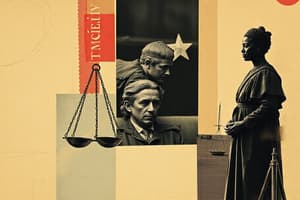Podcast
Questions and Answers
What is jurisprudence?
What is jurisprudence?
The understanding and practical application of law.
What does the word 'juris' denote?
What does the word 'juris' denote?
- Law (correct)
- Justice
- Skill
- Knowledge
Which theory believes in a higher law created by nature?
Which theory believes in a higher law created by nature?
- Social Contract Theory
- Natural Law (correct)
- Legal Positivism
- Distributive Justice
What is the main focus of distributive justice?
What is the main focus of distributive justice?
What is the social contract theory?
What is the social contract theory?
What does the analytical school consider law to be?
What does the analytical school consider law to be?
Legal positivism believes there is a higher law than human-made law.
Legal positivism believes there is a higher law than human-made law.
Match the following schools of jurisprudence with their main idea:
Match the following schools of jurisprudence with their main idea:
What are customs as a source of law?
What are customs as a source of law?
What is legislation as a source of law?
What is legislation as a source of law?
What is judicial precedent?
What is judicial precedent?
Flashcards are hidden until you start studying
Study Notes
Jurisprudence Overview
- Jurisprudence refers to the understanding and practical application of law, combining "juris" (law) and "prudentia" (skill).
- Defined as systematic, formulated knowledge or the science of human law.
Theories of Law
-
Natural Law Theory
- Asserts existence of a higher, objective morality independent of human opinion.
- Moral principles discovered through reason form the foundation of human laws.
-
Social Contract Theory
- State emerges from an implicit agreement among individuals originally in a state of nature.
- The establishment of governance and laws follows from this contract.
-
Legal Positivism
- Argues there is no higher law than human-made law.
- Law is determined solely by legislative enactments.
-
Distributive Justice
- Focuses on fair allocation of society’s resources.
- Addresses equitable distribution of burdens and benefits among individuals.
Schools of Jurisprudence
-
Analytical School (Imperative School)
- Defines law as a command from a sovereign authority.
- Emphasizes law as it currently exists rather than historical development.
-
Sociological School
- Considers law as a social construct closely linked to societal needs.
- Advocates for adapting laws to meet contemporary socio-economic challenges.
-
Historical School
- Believes law evolves in response to changing societal needs and customs.
- Originates from historical conventions, customs, and economic principles.
-
Natural School
- Bases legal philosophy on ethical values promoting upright living.
- Law's purpose is to maintain social harmony and justify restrictions promoting freedom.
-
Roscoe Pound’s Social Engineering Theory
- Law aims to fulfill maximum societal wants with minimal friction.
- Balances competing societal interests through law protection.
Sources of Law
-
Customs
- Unwritten rules and traditions significantly influence law formation.
- Essential features for customs to become law include:
- Antiquity (long practice duration).
- General knowledge and observance (not secretive).
- Reasonableness and alignment with existing legislation.
-
Legislation
- Process of making law, categorized into:
- Supreme Legislation: laws passed by Parliament.
- Subordinate Legislation: laws made by bodies under the authority of the supreme body.
- Process of making law, categorized into:
-
Precedent
- Judicial decisions from prior cases (binding on lower courts).
- Elements of judicial hierarchy determine which judgments are authoritative.
Definitions
-
Natural Persons
- Refers to individual human beings with legal rights and responsibilities.
-
Juristic Persons
- Entities such as corporations or organizations recognized by law as having rights and obligations.
Studying That Suits You
Use AI to generate personalized quizzes and flashcards to suit your learning preferences.




